It’s shameful that Canada and her provinces are too cowardly to have such a courageous integral office investigating frac’ing. All Canada got, was pro frac’ing (publicly proclaimed) Dr. John Cherry and his feeble, fraudulent, avoid the obvious and the damning data/published studies review and report by the Council of Canadian Academies, and the damning review and report by Health Canada that remains withheld from the public!
How much more dirty and biased could the Council of Canadian Academies get? At the time of their frac panel review/report, Elizabeth Dowdeswell was President and during the review/report had been appointed Director to the AER (energy regulator of Alberta) board!
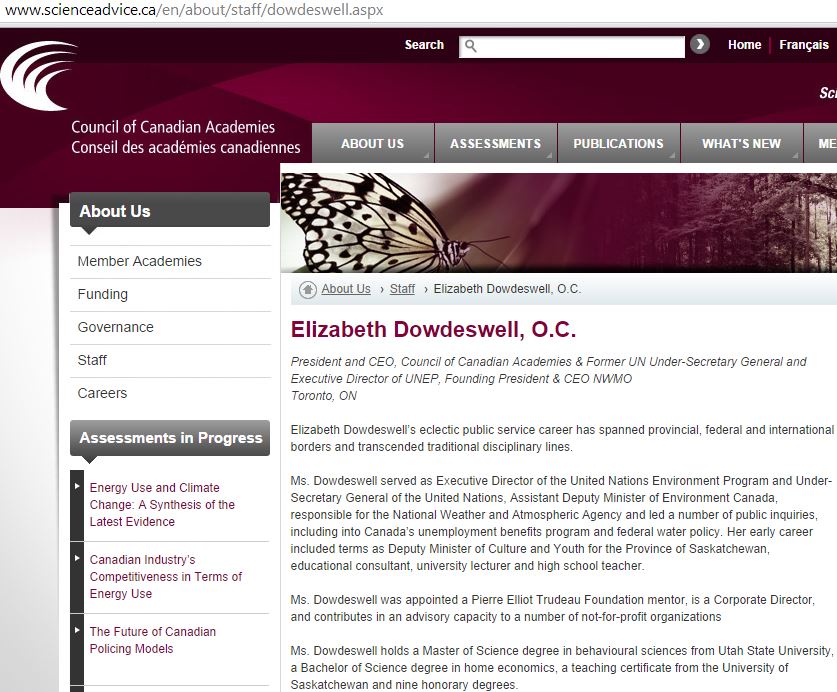
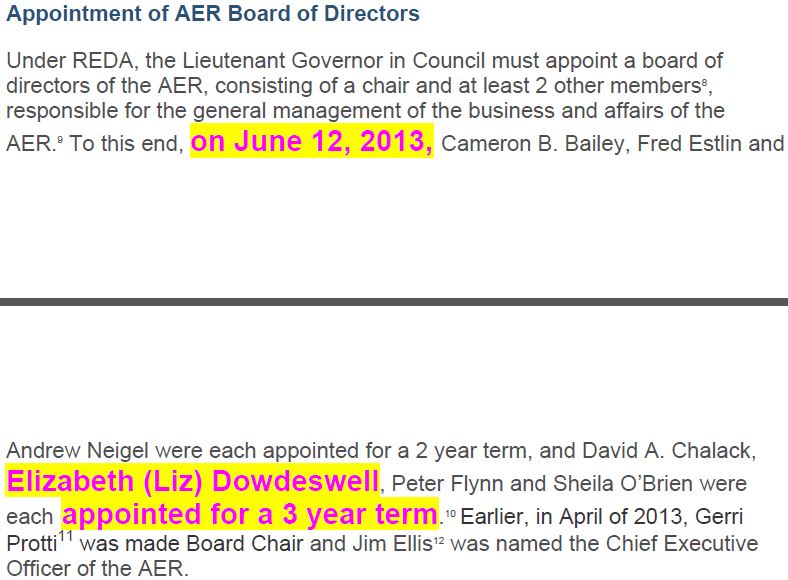
Gerri Protti was VP of law-violating, drinking-water-aquifer-frac’er Encana, and created/chaired CAPP, Canada’s big lies & propaganda oil and gas lobby group.
After the dreadful, cherry-picked report by the Council of Canadian Academies (led by Dr. John Cherry) was published, at the time Canadian Prime Minister Steve Harper made Ms. Dowdeswell Lieutenant Governor of Ontario. Her reward for the Council’s frac-enabling report?
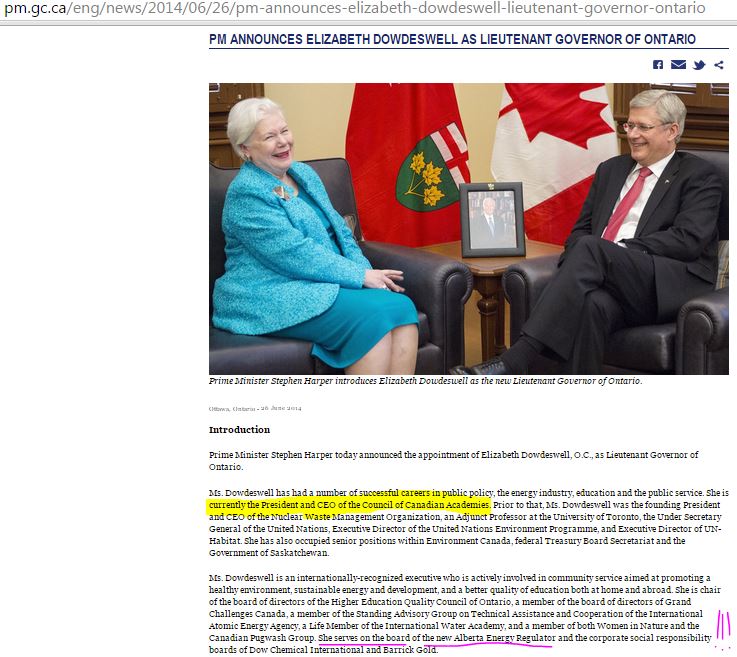
2015: What is Dr. John Cherry Promoting: Science or Propaganda?
2014: What’s Missing from Canada’s Fracking Debate? This is a long read. Because the current ‘debate’ leaves out so much.
2014: MUST READ: Dr. Maurice Dusseault, Public Advisor on Council Canadian Academies Frac Panel, Nova Scotia Frac Panel, New Brunswick Energy Institute (that promotes fracing) Filed Frac Patent in 2011; Frac Patent Issued in 2013
2014: Fracking Data Woefully Lacking in Canada, Reports Council of Canadian Academies, So also reported the Canadian Council of Ministers of the Environment 12 years ago
Why was a 2012 Health Canada Report, admitting significant health hazards and risks to groundwater and air from hydraulic fracturing, kept from the public? The government still has not released this report!
2011: The Council of Canadian Academies and Environment Canada to study hydraulic fracturing after group of harmed Albertans demand mortatorium
End compare to frac’d Canada
****
Fracking for shale gas in England by National Audit Office (NAO), Oct 23, 2019
Downloads
- Report – Fracking for shale gas in England (pdf – 1.07 MB)
- Summary – Fracking for shale gas in England (pdf – 83.33 KB)
- ePub – Fracking for shale gas in England (epub – 3.27 MB)
- Press Release
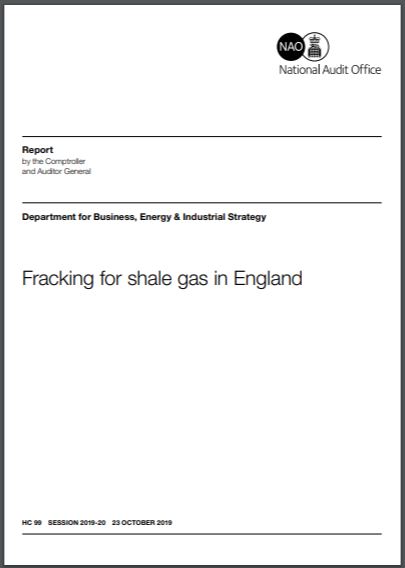
This report sets out the facts about the government’s support of shale gas development in England.
Background to the report
… The Department for Business, Energy & Industrial Strategy (the Department) leads government’s policy for shale gas development.
Content and scope of the report
Fracking for shale gas is the subject of media, public and Parliamentary interest. This report sets out the facts about the government’s plans to support shale gas development in England to help Parliament consider whether taxpayers’ interests are being protected effectively. It covers:
- an overview of fracking, and what activity has taken place to date (Part One);
- government’s objectives (Part Two);
- managing the risks from fracking (Part Three); and
- the costs to taxpayers (Part Four).
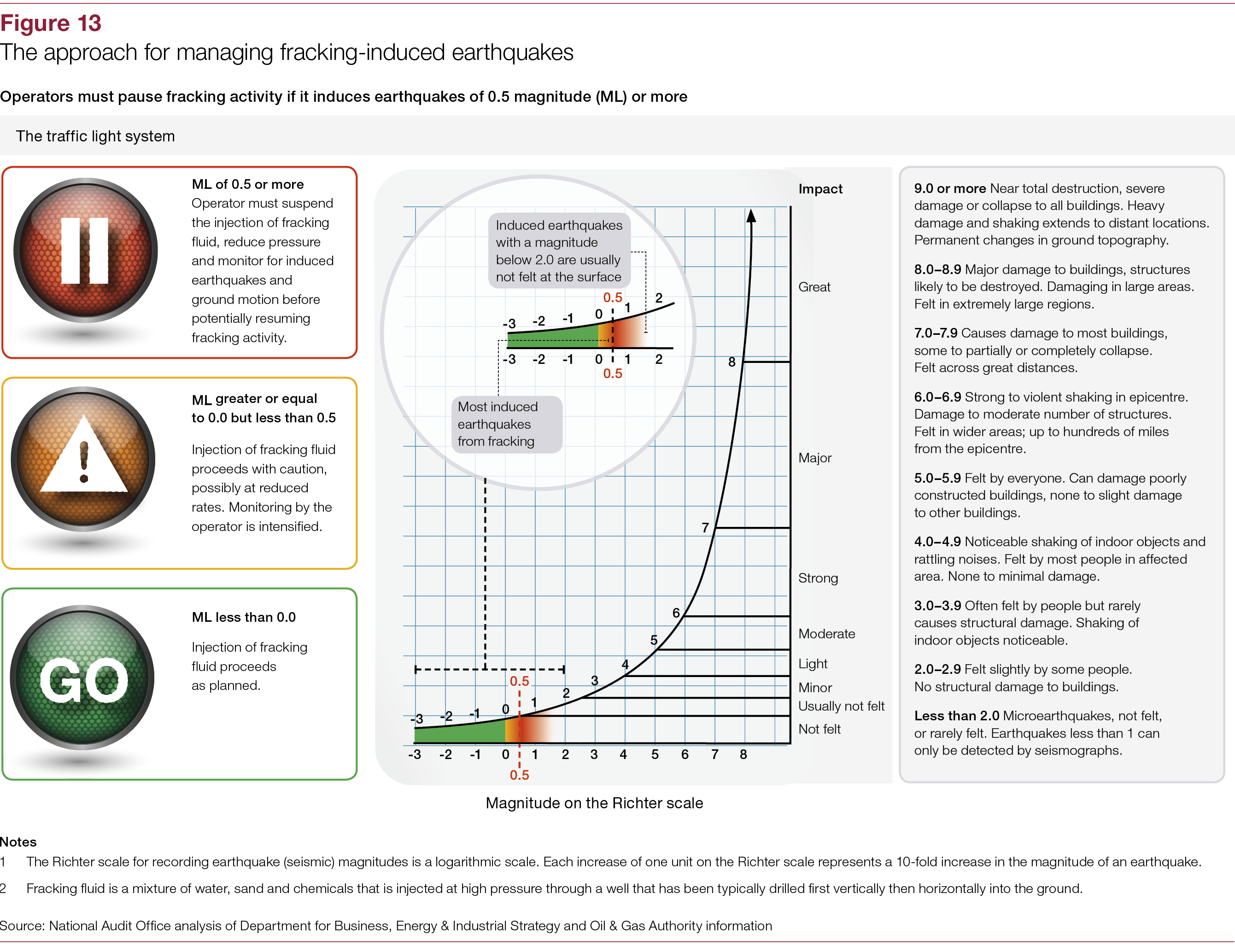
Publication details:
ISBN: 9781786042798 [Buy a hard copy of this report]
HC: 99, 2019-20
Published date: October 23, 2019
National Audit Office Report on frac’ing shale gas in England Press Release on behalf of UK National Groups, EMBARGOED UNTIL 23rd OCTOBER 2019, 00.01hrs GMT
A report by the National Audit Office has been released today on fracking for shale gas in England. Whilst the report does not seek to pass comment on the government’s policy or approach to fracking, it does, however, raise some crucial findings on the validity of pursuing this climate-damaging fossil fuel further.
Some of the most concerning points stated in the report include public spending:
- The costs to the taxpayers’ purse has topped £32 million, and that is a vast underestimation. This figure includes £13.4 million which was spent by three police forces on managing protests around shale gas sites. It does not include the cost of legal appeals, judicial reviews, or the time and expenses of civil servants working on these cases.
- Public acceptance of fracking from a community perspective. The government’s own public attitudes survey shows that opposition to fracking has almost doubled between 2013 to 2019, from 21% to 40%. The concerns of residents and the general public have centred on environmental impacts and public health risks, due to the lack of adequate regulations – this has been evidenced from Lancashire, where Cuadrilla Resources caused fracking-induced earthquakes over 0.5 magnitude, with the most recent resulting in an earthquake of 2.9 magnitude in August 2019.
- Clean-up costs: who is actually liable? The government have no solid answers or legislation on this serious issue.
Hundreds of reports of structural damage were received, with Cuadrilla only sending out public relations staff to assess the damage, and not building surveyors.
It has since been raised that Cuadrilla has refused to accept liability in many of these cases.
This raises serious questions of liability for clean-up costs, which is likely to fall to taxpayers. Additionally, landowners could be pursued by the Environment Agency for costs should the oil and gas company in operation cease to exists, however, this route is untested thus renders damage and clean-up liability still to be an unknown quantity.
The report is a validation that in ten years, there has been virtually no progress with the fracking industry.
The lack of government knowledge and awareness of the impacts of fracking is staggering, as are the claims that the UK has leading regulatory standards.
Coupled with the climate crisis humanity is currently facing, a new fossil fuel industry from fracking would be both reckless and nonsensical.
Comments from some campaign groups and politicians are as follows:
Steve Mason from Frack Free United, said:”What we have here is a truly independent verification of the facts and questions posed by the anti-fracking campaign. This report has exposed the fragilities of the government’s policy on fracking, leaving so many unanswered questions. The government has no idea how much gas they can extract, what the economic benefits are and they do not have the technologies available to limit emissions if we frack.
“It is highly likely that taxpayers will have to pay for the clean-up costs. Anyone reading this report must surely be thinking: “What on earth is going on? How can the government support this industry that is fast becoming more fantasy than facts?” We advocate an urgent ban on this dirty fossil fuel industry.”
Gina Dowding MEP commented on the report and said:“I think the first thing that the public would be interested in this report from the National Audit Office is what is actually going to happen to energy prices. What is clear is that the NAO has finally called out the cheap gas prices myth and that energy prices are not expected to fall: that’s because the shale gas industry cannot be easily compared to the North American model both because of difficult geology here and how our communities are much more densely populated. Aside from the myriad issues surrounding fracking, to even think of progressing with a new fossil fuel industry during a climate emergency, is nothing short of stupidity.”
Nick Danby from Frack Free Lancashire said:”This report from the National Audit Office reveals what we have always suspected: this government’s support for fracking is ill-considered, reckless and based upon ideology rather than cold, hard facts. The Department for Business, Energy and Industrial Strategy (BEIS) appears to have little idea as to how much gas there is, how much is recoverable and what is the potential contribution to the UK energy mix.
“It is very worrying that our government should have such little regard for facts and figures and it is especially concerning that it should continue to champion a new fossil fuel industry in the face of the threat of climate breakdown. We urge the government to stop subsidising fossil fuels and to ban fracking with immediate effect.”
Joe Corré, Head of campaign group Talk Fracking, said: “This is more doublethink to come from the government. A report which condemns fracking is at the same time still offering a faint flame of government support for the rapidly dying shale gas industry. Shale investors are finding it very difficult to give up the ghost. Unfortunately, their friends in government are still keeping it on life support despite all the science and public opinion giving a fatal prognosis for England. Fracking is over.”
Wera Hobhouse, Liberal Democrat Spokesperson for Climate Change said: “We can make all or nearly all our electricity from renewables by 2030. There is no place for fossil fuels in the power sector after then. By continuing to support fracking, the Conservatives demonstrate they are the party that delays climate action.”
A spokeswoman from Preston New Road Action Group, the residents’ campaign group closest to Cuadrilla’s site, said: “This report demonstrates that the cost-benefit case for shale gas has not been made satisfactorily. It is not clear how much shale gas can be extracted and without this knowledge, the benefits cannot be fully calculated. The technologies to manage risk from emissions are still not available. There could also be a huge cost burden on taxpayers in the future if they have to fund the decommissioning of sites. However, from the fracking that has taken place to date, some of the dis-benefits such as earthquakes and greenhouse gas emissions have been proven. Shale gas extraction just does not appear to have a sound business case.”
Maureen Mills from Halsall Against Fracking said: “This analysis is totally bewildering in that it reveals in one place the extent of the gross negligence by a government department. It confirms all the fears, and more, of local communities who have educated themselves about fracking and have witnessed Cuadrilla’s ineptitude on the Fylde with incredulity.
“It confirms the impotence of the so-called regulators that we were assured would ensure “Gold Standard” regulation. Unforgivably, the very clear climate change impacts of leakages and emissions have completely bypassed the BEIS despite the scientific evidence. Surely in the face of this concise and damning report, the unprecedented and mounting public opposition to fracking will now be given due weight against industry favours from government?”
ENDS
Notes to Editors
Embargoed report download link
Claire Stephenson
email email hidden; JavaScript is required
mobile +44 07929 969664
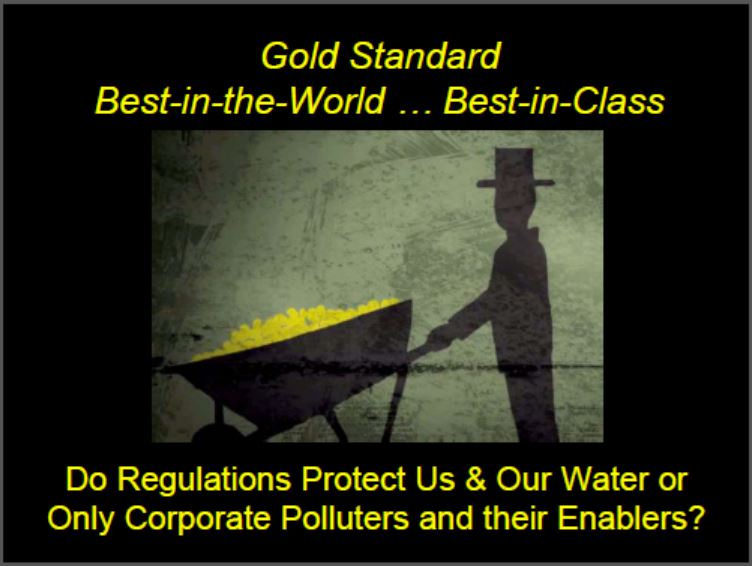
Slide from Ernst 2017 presentations in UK
Fracking’s slow progress in England by SciTechEuropa, 21st October 2019
Progress in establishing a shale gas industry in England has been slower than government planned, according to today’s report by the National Audit Office (NAO).
Government has committed to developing a shale gas industry in England amid public concern over the environmental and public health risks from fracking. In response, the NAO has reviewed the current landscape of hydraulic fracturing (fracking) of shale gas in England.
The Department for Business, Energy and Industrial Strategy does not know how much shale gas can be commercially extracted in the UK. In 2016, Cabinet Office expected up to 20 fracked wells by mid-2020. Three wells have been fracked to date.
The Department has encouraged operators to determine the viability of the industry and introduced measures to support the planning process. Operators have said the system to protect against the risk of earthquakes is stricter than that used internationally and has hindered their ability to develop the industry.
The Department does not expect shale gas production to lead to lower energy prices, but believes it could [big difference between “could” and “will”] provide greater energy security and have economic benefits. However, it has not analysed the benefits or costs of supporting the shale gas industry because it thinks this would not be meaningful due to the current uncertainty about how much shale gas can be extracted.
Public support for shale gas development is low and has reduced over time. Concern has centred on the risks to the environment and public health from greenhouse gas emissions, groundwater pollution and fracking-induced earthquakes, as well as the adequacy of existing regulations.
Government has told the NAO that it is confident the regulatory regime can manage these risks. [Yes, by massively deregulating and taking property owner rights away to enable frac’ing and its many known harms] Regulators have so far focused on the current exploratory stage and mainly rely on a system of statutory self-reporting by the operator, which presents risks. Should the industry ramp up to full production quickly, the Environment Agency (EA) is confident it can respond at pace. [Industry and regulators/govts know it’s impossible to frac safely, and they know the only way to “regulate” frac’ing is to “deregulate”]
The Department believes it can meet its climate change objectives while developing shale gas, but it has not yet developed the necessary technology.
The Committee on Climate Change states that the development of carbon capture, usage and storage technology (CCUS) is critical to reducing greenhouse gas emissions, because it would provide a way to use fossil fuels, including shale gas, in a low-carbon way. The Department held two unsuccessful competitions in 2007 and 2012 to develop and implement CCUS. In 2018, it set out its aim to develop the first CCUS facility in the mid-2020s.
****
CCUS Reality Check
UK ruling delivers blow to oil & gas companies claiming natural gas is environmentally friendly. Advertising Standards Authority rules natural gas is ‘not a low-carbon fuel.’ Equinor should not have implied it was environmentally friendly
Denbury fined $662,500 for Mississippi blowout of CO2 injected in high pressure enhanced oil recovery, So much carbon dioxide came out that it settled in hollows, suffocating deer and other animals
CO2 in Stream, Dead Ducks Prompt Wyo. DEQ Citation
End CCUS Reality Check
****
Fracking has already placed financial pressures on local bodies, including local authorities and police forces, and other costs have been borne by a range of government departments and regulators.
The full costs of supporting fracking to date are not known by the Department, but the NAO estimates that at least £32.7m (~€38m) has been spent by public bodies since 2011. This includes £13.4m spent by three local police forces on maintaining the security around shale gas sites to date. [Why are companies not paying for the policing? They need it, they benefit from it, they ought to pay for it, completely, not the people being harmed by the companies.]
The Department recognises its responsibility for decommissioning offshore oil and gas infrastructure, but not for onshore wells, including shale gas wells. In January 2019, the NAO reported that government is ultimately liable for the total costs of decommissioning offshore infrastructure that operators cannot decommission.
In March 2019, the Committee of Public Accounts set out concerns about the Department’s arrangements for ensuring the cost of decommissioning shale gas wells do not fall to taxpayers.
The Department says landowners may be liable for decommissioning costs of shale gas wells should an operator be unable to fund them, but arrangements are unclear and untested.
In May 2019, the Department informed the Committee of Public Accounts that the EA could pursue operators and landowners under the Environment Liability Directive and Environmental Damage Regulations. However, in October 2019 the EA determined that it is unable to use these powers to pursue insolvent operators and landowners.
The EA may be able to pursue landowners under other statutory powers, but these are untested in the oil and gas sector. The Department could not explain what would happen should a landowner be unable to meet decommissioning costs.
Government lied over fracking clean-up [OF COURSE THEY DID! All gov’ts enabling frac’ing (and its endless harms) lie about it] by The Times, Oct 23, 2019
Fracking sites could become a permanent blot on the landscape because of a weakness in decommissioning rules, according to the public spending watchdog.
The government made false assurances that the Environment Agency would be able to pursue fracking companies and landowners for the costs of restoring sites, the National Audit Office (NAO) has said.
…
Fracking ‘years behind schedule’ despite £32m cost by BBC Business, 23 October 2019
Getting fracking up and running in England has been slower than expected, an official report has found.
In 2016, the government forecast up to 20 wells would be fracked by mid-2020, but only three have been so far.
“Low public acceptance” of the controversial oil and gas extraction technique is partly to blame, the National Audit Office (NAO) found. [Smart public!]
The UK has spent at least £32.7m supporting fracking since 2011, the government spending watchdog found.
Industry trade body UK Onshore Oil and Gas said the industry was still in “the early exploration stages”.
“It is not uncommon to see delays in the energy sector, as experienced in the development of the North Sea oilfields, onshore wind industry and new nuclear,” said chief executive Ken Cronin.
Is the future of fracking now in doubt?
…
‘Unprecedented opposition’
The report found fracking had placed financial pressures on local bodies, including local authorities and police forces, which had been brought in to manage protests and maintain security.
Lancashire Constabulary reported that between 25 and 100 officers were directly involved in the policing of fracking sites every day between January 2017 and June 2019, at a cost of £11.8m.
Overall, Lancashire Constabulary, North Yorkshire Police and Nottinghamshire Police spent over £13m in two-and-a-half years providing security at shale gas sites, the report found.
There has been growing public disquiet about fracking. In 2013, 21% of government survey respondents were against shale oil and gas extraction. This rose to 40% of respondents in 2019, the NAO said.
Local authorities told the NAO the scale of opposition to fracking planning permission was “unprecedented”.
“Lancashire County Council reported receiving about 36,000 representations from the public in relation to two fracking applications,” it said.
People are concerned about risks to the environment and public health, earthquakes, and the adequacy of safety rules, the NAO said.
The industry told the NAO that slow progress on fracking was partly due to “stringent” UK rules to protect against the risk of earthquakes, which were stricter than international ones. [Nice try industry! Cuadrilla being unable to drill and frac safely as promised, without causing damages to hundreds homes, the more accurate reason]
Operators need to halt fracking activity if there is a tremor greater than 0.5 on the Richter scale.
In August, a tremor with a magnitude of 2.9 was recorded near the UK’s only active shale gas site in Lancashire. Operations at energy firm Cuadrilla’s Preston New Road site have been suspended since then.
In 2013, there were heady promises that gas extracted from fracturing shale rock with water under high pressure could revolutionise the UK energy industry.
A technology that had changed the US energy industry and geopolitics with it could provide a bonanza of benefits to the UK.
As the gas from the North Sea dwindled, fracking would step in to make the UK less reliant on foreign imports that make up 60% of our gas supply.
This home grown resource would see prices fall and security of supply rise. It would provide tens of billions of new investment and tens of thousand of jobs in areas that desperately needed it and all this could be done safely and environmentally responsibly. [Lots of spinning hot air]
** Reality Check**
In Texas, energy companies cut nearly 6,000 jobs over past four months. In western Canada, Husky cutting hundreds of jobs, most cuts in Calgary. Kenney’s $4.5 billion in corporate tax cuts obviously not enough to feed the greed Numerous cross references about industry’s/govt’s endless broken promises about jobs and riches in this post.
Yet another frac’er bites sweet dust: Weatherford facing more than $10Billion in debt files for bankruptcy protection. US court order accepts restructuring plan, which includes Weatherford getting $2.2Billion in magic money; Stockholders to receive proportionate shares of the company’s **new stock** while operations continue as “normal.” This post has numerous cross references to endless bankruptcies in the frac industry, complete with companies walking from mandated cleanup, as has been industry’s/regulators’ plan from frac day one.
** End Reality Check**
The NAO report is a hammer blow to those aspirations. [Bravo to the report authors/researchers, for exposing the much needed hammer pounding.]
It found no evidence that prices would be lowered, uncertainty as to whether it could viably produce gas in meaningful quantities, no plan for clean-up if a fracking firm were to go bust, serial breeches of agreed limits on earth tremors, strains on local authorities in fracking areas, and plummeting public support.
The Department for Business, Energy, and Industrial Strategy (Beis) said: “The government has always said shale gas exploration can only proceed as long as it is safe and environmentally responsible.”
“The Oil and Gas Authority [regulator] will soon publish a finalised scientific assessment of recent industry data and we will set out our future approach as soon as we have considered the findings.”
Refer also to:
UK: Cuadrilla moving out! “Frack Free Lancashire is delighted to learn that 35 days after they caused a 2.9ML earthquake which shook the Fylde and the confidence of their investors, Cuadrilla are finally demobilising…. The seismic activity which they provoked has not stopped though, with the 133rd event being recorded on Saturday, five weeks after they last fracked.”
What the Frac Hell is going on in Canada! 3.9M earthquake west of Frac’d Crazy Fox Creek Alberta reported by Earthquakes Canada, 1 km depth, now scrubbed from their website!
4.6M earthquake, 1 km in depth, most powerful yet in central Alberta, hits SW of Red Deer, cracks walls in homes, knocks power out to thousands. Vesta Energy reports quake to AER, shuts down frac’ing. AER investigating. Geological Survey of Canada says looks like fra’cing didn’t do it.
Terrifying! Injected oilfield wastewater may trigger earthquakes for ‘decades.’ More terrifying: Percentage of high-magnitude quakes felt at the surface increases with depth of waste injected & may create greater magnitude quakes years after injection rates decline or stop.
Questerre’s partner to frac Quebec is Repsol, creator of 4.8M world record frackquake, day of Ernst vs AER Supreme Court of Canada hearing. “The Alberta Model” Knocks Quebec’s People to their Knees: Gov’t of Quebec Takes Your Land & Rights, Gives Them to the Frackers – For Free
AER allows Repsol to resume fracking after causing world record 4.8M frac quake (felt 280 km away near Edmonton) in AER’s Fox Creek Blanket Approval Frac Frenzy Free-for-All Experiment. But, Repsol appears too shaken to resume
Ernst vs AER Supreme Court of Canada hearing followed by 4.8M quake in AER’s Immoral Blanket Approval Frac Experiment Gone Wild, felt in St. Albert, 280km away
BNN Interviews Alberta Oil Patch Consultant Brent Nimeck on Lexin and AER’s Orphan Wells: “This problem is 30 years in the making. … I would call it a Ponzi Scheme…. This is an orchestrated fraud from multiple angles: Industry, CAPP and the Alberta Energy Regulator have enabled this to happen. … Through our independent analysis and we’ve confirmed this at multiple sources within the energy regulator, the liabilities are over $300 billion. That’s what’s on the hook for Alberta taxpayers right now – $300 billion.”
A Case History of Tracking Water Movement Through Fracture Systems in the Barnett by P. Handren, March 2011, Shale EPA Workshop
“As well density increases it becomes increasingly probable that wells will communicate either through previously created fractures or through adjacent wellbores and then into previously created fractures.”
The Role of the Upper Geosphere in Mitigating CO2 Surface Releases in Wellbore Leakage Scenarios
Scientific American: Can Fracking and Carbon Sequestration Coexist?
